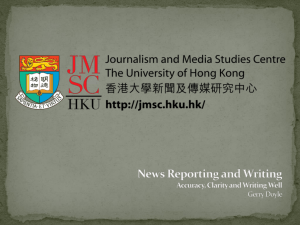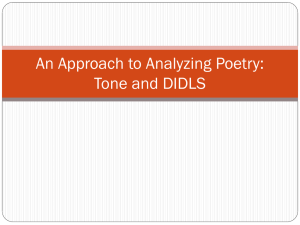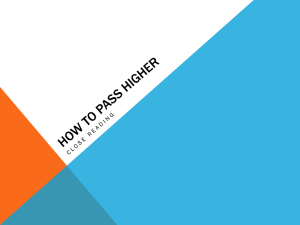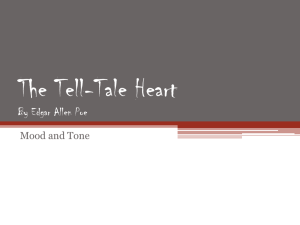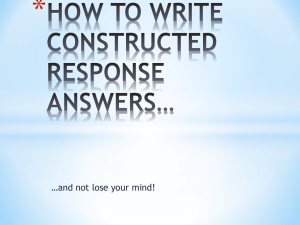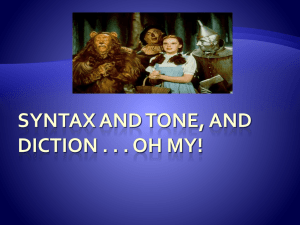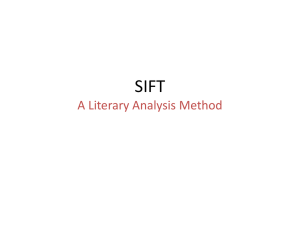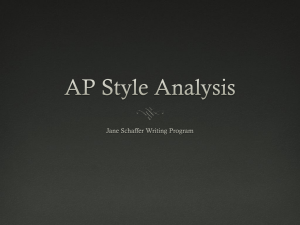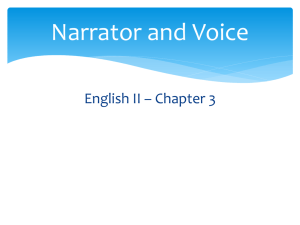Conflict Poetry Revision
advertisement
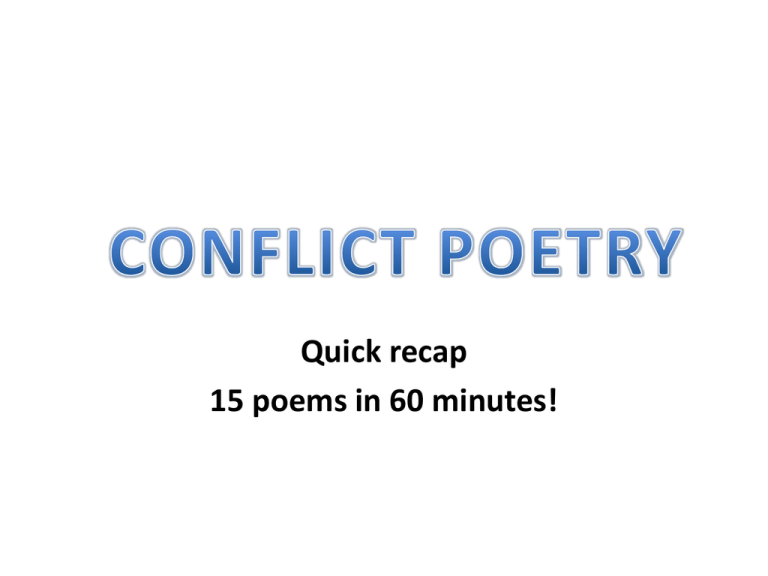
Quick recap 15 poems in 60 minutes! FLAG • Meaning Pride in your country versus dangers of patriotism • Tone Sarcastic, positive ideas but with negative consequences • Language Just a piece of cloth – mocking and undermining its power Negative war imagery to convey danger of patriotism • Structure Well-structured - links to military and how organised conflict can be Stanza structure changes at end – emphasises the final line as summing up poem OUT OF THE BLUE • Meaning Fear, hope, life and death, hopelessness, desperation, terrorism, 9/11 • Tone Hopeful changes to hopeless, panicky tone • Language Repetition of ‘waving’ to show desperate to be saved You – direct address used to make poem personal as it could have happened to anyone • Structure Short stanzas and short lines – man gasping for breath Enjambment to show he has no time to stop and think MAMETZ WOOD • Meaning Death of soldiers, time/memory, waste of war, friendship • Tone Impersonal – shows that people become faceless in war, melancholy tone • Language Men told to ‘walk not run’ – shows how innocent and childlike (and young) they were ‘China plate’, ‘bird’s egg’ – all fragile – shows fragility of life • Structure Narrative – like a story (memory) THE YELLOW PALM • Meaning Tradition, poverty, victims, hope, culture • Tone Positive tone even though it is about war deaths – shows that life goes on • Language Images of modern life juxtaposed with images of warfare Palm – symbol of hope and peace – they remain hopeful Links between religion and violence – religion starts war • Structure Ballad form – tells a story Every second line rhymes – creates a sense of a funeral song – melancholy dirge THE RIGHT WORD • Meaning Innocence, perception, fear, hope, stereotyping • Tone Fear, negativity and isolation changes to acceptance and forgiveness • Language Repetition ‘outside the door’ and ‘shadows’ emphasises fear Questions – draw reader in to think about how they might judge people themselves Simple words to describe the boy at the end – imply innocence • Structure Short stanzas show narrator changing mind quickly about how to judge the boy AT THE BORDER, 1979 • Theme / meaning There is a world greater than individual countries Contrast between expectations and reality National boundaries/restrictions are perceived as negative • Tone Nostalgic. Child’s excitement changes to disappointment • Language Simple language conveys childlike innocence and hopeful expectations ‘Chain’ symbolises division between people – borders Contrasts with ‘chain’ in last line, which symbolises how all people are connected and all are on the same earth • Structure Narrative from child’s perspective Caesura in stanza 5 symbolises them crossing the border and the tone change from excited to disappointed BELFAST CONFETTI • Meaning Violence, fear, home, war causes confusion • Tone Negative, harsh, confusion • Language ‘Confetti’ links to celebration but is ironic as it’s actually describing debris Punctuation marks used for various reasons – ‘fusillade of question marks’ shows he is questioning why and can’t understand – is confused • Structure Present tense – causes sense of panic as happening now Unfinished lines – narrator can’t finish sentences as he is panicking and is confused as to why it has happened POPPIES • Meaning Mothers and sons, memories, young soldiers, death, individual people • Tone Sad but hopeful • Language ‘Poppy’ represents sacrifice and ‘dove’ represents peace – implies that he is dead and is now at peace ‘Songbird’ represents letting her son go ‘Wishbone’ – metaphor to symbolise she wishes he would return Sewing references to show her role as mother and relating situation to something she is familiar with • Structure Past tense – narrative style with no end – we are left unsure as to where the son is now FUTILITY • Meaning Pointlessness, hopelessness, death, comradeship • Tone Hope in stanza 1 changes to hopelessness in stanza 2 • Language Personification of the sun – symbol of hope and positivity contrasts with ‘cold star’ – negative image Questions – war makes us question everything • Structure Stanza 1 – gentle and flowing symbolising the hope Stanza 2 – broken up with question marks and dashes – questioning the futility of war – pointless death - unsettling THE CHARGE OF THE LIGHT BRIGADE • Meaning Patriotism, bravery, leaders, death • Tone Positivity for the brave men (even though they don’t come back, they are to be honoured) • Language Repetition symbolises the relentless attack ‘Rode the six hundred’ changes to ‘not the six hundred’ because they have died • Structure Irregular rhyme scheme shows uncertainty – will they return or not? Two sides to poem showing before the attack and after the attack BAYONET CHARGE • Meaning Horror of war, patriotism, humanity • Tone Negative, horrific, panic • Language Similes to show physical and mental pain of soldier – ‘sweating like molten iron from the centre of his chest’ – could symbolise his heart Image of the yellow hare being shot – shocking – effects of war on everyone and everything Full of negative war imagery to do with injury • Structure Enjambment to show the speed of the man who is running – panicking and doesn’t have time to stop No other people mentioned – shows the inhumanity of war Imagery makes it seem like a dream - unreal THE FALLING LEAVES • Meaning Waste of war, mourning, casualties, death • Tone Mood of reflection, positive images convey negative overall message • Language Positive nature imagery contrasts with the reality of war Alliteration makes it dreamy and a bit eerie Positive images of soldiers as ‘falling leaves’ shows that they are being mourned and remembered fondly • Structure No stanzas to give it a narrative feel, a story in the past tense ‘COME ON, COME BACK’ • Meaning Memory, identity, death, nuclear war effects • Tone Negative at the beginning changes to positive once she is dead • Language ‘Icy-amorous embrace’ oxymoron - presents the water as a lover, welcoming – death is more inviting than life Water personified and symbolises death, but in a positive way Repetition makes it more like a dream, hypnotic – also adds to the sense of confusion caused by her memory loss • Structure Narrative style told in present tense as if people are watching her but from a distance and can’t stop her from killing herself – inevitability of war NEXT TO OF COURSE GOD AMERICA I • Meaning Patriotism, religion, death • Tone Satirical, mocking patriotism, sarcastic • Language Childish words and nonsense words used – ‘by gosh by gum’ – shows that what the speaker is saying is nonsense – patriotism is all for show Uses a line from the national anthem - ‘land of the pilgrims’ and other clichés to mock • Structure Written in lower case to show that it is not important, the narrator is mocking patriotism Rhyme adds to the mocking tone of the poem HAWK ROOSTING • Meaning Instinct, nature, death, power • Tone Positive tone of power • Language Language is sophisticated and shows he is educated, but this contrasts with the stupidity of what he is talking about ‘I hold creation in my foot’ – he has people in the palm of his hand – powerful Negative images ‘tearing off heads’ – contrasts with the mention of the sun and other positive nature imagery • Structure Persona of a hawk symbolises a dictator Stanzas all same length – shows calmness and rational mind of the hawk who is controlling the violence
